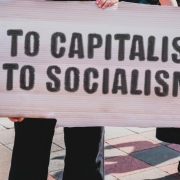The World’s Have Nots Flock To America To Participate In Our Capitalism For The Common Good.
Quick question: how many friends, relatives or acquaintances can you the reader name who have moved to Buffalo, NY, Charleston, WV and Jackson, MS in the past five years? Do you even need a minute, or minutes to come up with an answer? Conversely, how many of the same do you know who’ve moved to New York City, Dallas, or San Francisco during the same period?
These basic questions came to mind while reading Sen. Marco Rubio’s latest self-flagellation related to his failure to have any kind of impact on the 2016 Republican presidential primaries. Rubio was only a factor insofar as his existence unearthed the ultimate line from the execrable GOP debates about “Little Marco.” Love or hate Donald Trump, he’s at least funny at times. Some times extraordinarily funny.
In a recent piece for National Review in which Rubio made a case for “Common-Good Capitalism”, the Florida senator tied the “disruption of the Industrial Revolution” with “the rise of socialism.” The problem with the two is that they’re unrelated. Or at least unrelated in the way that Rubio imagines.
To the Senator, socialism is the logical consequence of great industrial leaps given the alleged hurt feelings of the so-called “have nots” amid the leaps. No, that’s not how it works. As we’ve seen throughout history, the world’s have-nots have routinely risked everything (including their lives) to get to the most industrialized, economically unequal country on earth. That country would be the United States. And then within the United States we see to this day that the have-nots looking for a better life never migrate to where people are most equal; rather they move to where the richest of the rich live and work. They do so for obvious reasons. Opportunity is greatest where wealth is greatest. It’s really very simple.
An inconvenient truth for members of the left who think wealth creation harms the poor, along with individuals like Rubio who are convinced that wealth creation kind of harms them, is that the actual poor disagree. Their constant migration away from where poverty is greatest, and to locales where wealth is greatest, is the surest sign that the relentless capitalism that has Rubio in the fetal position is what the supposed victims of capitalism (the poor) aim to be a part of.
So what about the socialism that Rubio laughably claims is a consequence of industrial advance? It’s not as he thinks. Abundant wealth creation doesn’t galvanize the poor as much as it’s often a lure for those who’ve already enjoyed the fruits of capitalism (think Marx and Engels, along with AOC, Sanders and Warren in modern times), but who want more of it. In short, wealth creation begets socialism by virtue of it giving opportunists who desire the fruits of wealth a way to access it without creating it.
AOC, Sanders and Warren don’t live like socialists, and that they don’t is a statement of the obvious. Their socialism is a consequence of immense wealth creation by others that gives them a platform, and that gives them a way to reach as many people as possible (think the internet, to use but one example) on the way to fame, and ultimately fortune. Rubio yet again has it incorrect. Unfettered capitalism is a magnet for those without, and it at the same time exists as an opportunity for the haves (think yet again AOC, Sanders and Warren) who want more, but who don’t want to endure the actual work required to create it. So they embrace socialism in order to attain the fruits of capitalism.
Rubio adds in seemingly “benevolent” fashion that “businesses have a right to make a profit, but they also have an obligation to reinvest those profits productively for the benefit of the workers and the greater society. Similarly, workers have a right to share in the benefits of the profits they helped create.” Actually, none of what Rubio writes (or that more likely was written for him) is true.
Businesses are owned by individuals, and individuals have no obligation to please Marco Rubio. As individuals we have endless rights that pre-date Rubio, and that exist simply because we’re humans. No politician need state that we have a right as shareholders to be owners of profitable enterprises. For Rubio to presume to bestow upon us a right is for the Senator to presume a power vested in government that doesn’t exist. After which it’s the job of businesses to turn a profit unless said business has owners who don’t care about profits.
What about workers? Do they “have a right to share in the benefits of the profits they helped create” as Rubio states? Actually no. Figure that the owners in any business are taking all the risks, they lose all of their investment (investment that is the source of all job creation) if the business goes under, so assuming Rubio had the power to decree worker rights, which he doesn’t, one could logically conclude that workers who enjoy a profitable upside should also help foot the bill for any unprofitable downside. Of course they’re not expected to do that, nor would the generous-with-the-money-of-others Rubio make such a case. In his or his ghostwriter’s delusional view of the word, those who take on the least risk should get all of the upside and none of the downside, by decree.
So while workers have no explicit rights to profits as Rubio (or ghostwriter) naively contends, the beauty of capitalism is that workers usually enjoy what can’t possibly be decreed insofar as businesses are profitable. On the high end, members of the New York Yankees baseball team earn enormous salaries, and employees of highly valuable companies like Apple, Google and Amazon earn well while attaining valuable equity stakes in those companies insofar as those companies profit. Too rich for your blood? Ok, at Starbucks baristas increasingly enjoy high wages, health insurance and free college education. Employees of Disney have student loans paid off. At Wal-Mart, enormous sums are spent educating entry-level employees so that they can move into management.
You see, contrary to what Rubio or his ghostwriter dreams, profitable businesses don’t need a law. They get that way by spending copious amounts in order to retain their workers. Translated, it’s incredibly expensive for them to lose those who help them achieve profits, so they spend a great deal in order to hire these workers, and spend more to keep them hired.
Of course, all of the above is obvious to those who choose to look. You see, just as the poor routinely migrate to where the rich are, they also migrate to where the richest, most profitable companies are. They do because those are the ones that pay the most, by far. Rubio, in his desperate attempt to matter, wants to command what’s already being done voluntarily. Rubio is the embodiment of superfluous.
Not surprisingly, this most redundant of politicians decries Wall Street and the “financial flows” that allegedly harm workers, except that investment is always and everywhere the driver of job opportunity. All that, plus it’s the corporations most courted by Wall Street that have the greatest means to compensate workers the most handsomely. Translated, Rubio can’t even be bothered to be right, or reasonable. He or his ghostwriter merely spout lines that are most often heard in college dorms before the kids are mugged by reality.
Which is why Rubio’s comments about China won’t even be addressed. It’s not fair to the reader. But as a hint, Senator Redundant claims that “China,” unlike any other country in the history of mankind, can plan wondrously profitable outcomes for its people.
Of course, Rubio’s droolings about China likely explain why he believes what he does about capitalism. In each instance, the Senator believes capitalism can be planned by those like him who have no experience with it. Sorry, but capitalism is far too glorious for politicians to engineer, which is why the U.S. has been a magnet for so long to the world’s strivers. They’ve been escaping “Little Marco” types around the world for centuries.














